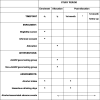Impact of the aldehyde dehydrogenase 2 (ALDH2) gene testing on alcohol drinking behaviors among the Chinese Han population: study protocol of a single-center, open-label, randomized, controlled clinical trial
- PMID: 40336132
- PMCID: PMC12057152
- DOI: 10.1186/s13063-025-08851-5
Impact of the aldehyde dehydrogenase 2 (ALDH2) gene testing on alcohol drinking behaviors among the Chinese Han population: study protocol of a single-center, open-label, randomized, controlled clinical trial
Abstract
Background: Alcohol consumption may induce multiple disorders, and decreased alcohol consumption has been proved to be effective to reduce the incidence of alcohol-associated diseases and mortality. Pharmacotherapy is the most common option for the management of alcohol problems; however, it suffers from multiple problems. Non-pharmaceutical interventions are therefore of urgent need to change alcohol intake among alcohol users. Aldehyde dehydrogenase 2 (ALDH2), which encodes the ALDH2 gene, is an important enzyme in ethanol metabolism. Previous studies have demonstrated that individuals harboring ALDH2 gene mutations are more likely to present discomfort symptoms and are more susceptible to multiple cancers. It is hypothesized that ALDH2 gene testing may reduce alcohol consumption and the incidence of alcohol-associated disorders among unhealthy alcohol users.
Methods: A single-center, open-label, randomized, controlled clinical trial was designed, aiming to recruit 940 unhealthy alcohol users at ages of 18 to 60 years. All participants are randomized into the interventional and control groups, and both groups are given alcohol consumption health education. In addition, blood samples are collected from participants in the interventional group for ALDH2 gene testing, with testing reports issued, while ALDH2 gene testing is not performed in the control group. Changes in alcohol intake, hazardous drinking days, and alcohol-associated adverse events are recorded prior to and post-interventions. The primary outcome is alcohol intake, and the secondary outcomes are hazardous drinking days and alcohol-associated adverse events.
Discussion: This trial will provide strong evidence regarding the impact of ALDH2 gene testing on alcohol use behaviors.
Trial registration: The study has been registered in the Chinese Clinical Trial Registry (registration no. ChiCTR2400087726) on 2 August 2024.
Keywords: ALDH2 gene; Alcohol intake; Alcohol-related disease; Genetic testing.
© 2025. The Author(s).
Conflict of interest statement
Declarations. Ethics approval and consent to participate {24}: This single-center, open-label, randomized, controlled clinical trial has been approved by the Medical Ethics Review Committee of Nanping First Hospital Affiliated to Fujian Medical University (approval no. NPSY202309019) on September 27, 2023. Consent for publication {32}: Not applicable. Competing interests {28}: The authors declare no conflict of interests.
Figures
Similar articles
-
Effectiveness of genetic feedback on alcohol metabolism to reduce alcohol consumption in young adults: an open-label randomized controlled trial.BMC Med. 2024 May 20;22(1):205. doi: 10.1186/s12916-024-03422-y. BMC Med. 2024. PMID: 38769537 Free PMC article. Clinical Trial.
-
[Polymorphism of alcohol metabolizing-related enzyme genes and its correlation with drinking-behaviors in 201 cases of Chinese Han healthy population].Zhonghua Yu Fang Yi Xue Za Zhi. 2005 Mar;39(2):84-7. Zhonghua Yu Fang Yi Xue Za Zhi. 2005. PMID: 15842823 Chinese.
-
Alcohol Intake Interacts with Functional Genetic Polymorphisms of Aldehyde Dehydrogenase (ALDH2) and Alcohol Dehydrogenase (ADH) to Increase Esophageal Squamous Cell Cancer Risk.J Thorac Oncol. 2019 Apr;14(4):712-725. doi: 10.1016/j.jtho.2018.12.023. Epub 2019 Jan 9. J Thorac Oncol. 2019. PMID: 30639619
-
Alcohol Consumption, Aldehyde Dehydrogenase 2 Gene Polymorphisms, and Cardiovascular Health in Korea.Yonsei Med J. 2017 Jul;58(4):689-696. doi: 10.3349/ymj.2017.58.4.689. Yonsei Med J. 2017. PMID: 28540979 Free PMC article. Review.
-
Alcohol and aldehyde dehydrogenase polymorphisms and a new strategy for prevention and screening for cancer in the upper aerodigestive tract in East Asians.Keio J Med. 2010;59(4):115-30. doi: 10.2302/kjm.59.115. Keio J Med. 2010. PMID: 21187698 Review.
References
Publication types
MeSH terms
Substances
Supplementary concepts
Grants and funding
LinkOut - more resources
Full Text Sources
Medical
Miscellaneous



